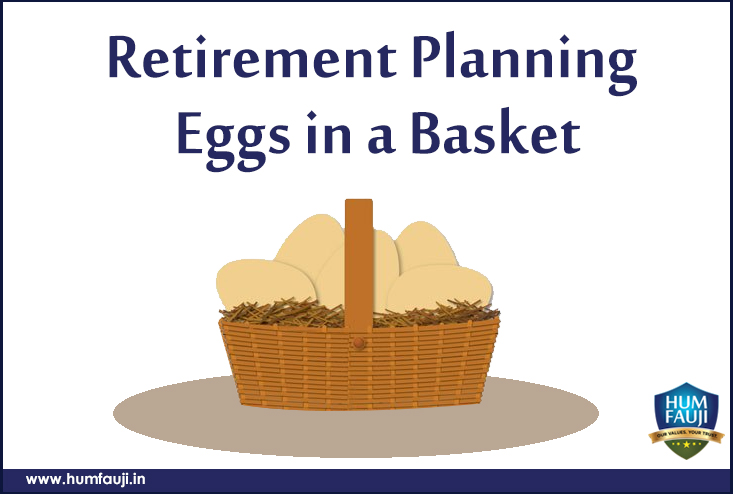Life insurance should be used only as a financial protection tool
for your loved ones dependent on you, NEVER to create wealth.
There are many investors who happily say they have 5, 7, 10 or even more life insurance policies and the maturity amount of each policy (usually 15-20 years later) is twice or thrice the total premiums that they will pay. They feel they have made a very savvy investment and it will help them meet all their financial commitments in life. They are usually concerned with only one question while buying these policies, “How much will I get back from it?” Do they know that most such policies actually give them returns in the range of 6-7.5% only!! Rarely do these policies go beyond this range. This is so because buying insurance for the sake of investments or savings for future is like trying to dig a well with a spoon – not that there is anything wrong with the spoon, but the purpose for which it is being used is absolutely wrong.
Insurance is a service purchased to replace any financial loss incurred by you due to any unfortunate event. For example, you can insure your car, house, health and property to replace the loss in the event of damage, theft, fire, accident, etc. You can similarly insure your life for the sake of those who are financially dependent on you so that in case something happens to you as the main bread-winner of the family, at least your family gets a decent amount of money to carry on with their basic requirements of life till they can stand on their own feet. Hence, the purpose of insurance is purely to replace a financial loss. Investment on the other hand, is what you hold, allow its value to grow at a smart pace and then sell for consumption in future. Hence, one always invests at the best possible rate of return to fulfill future goals such as children’s education, their marriage, purchasing a house, dream vacations or retirement funding – of course, all the investments have to be consistent with the amount of financial risk you are prepared to take.
It’s not at all a good idea to mix the two – insurance and investment !!
Let’s understand this by a simple example:
A and B, both aged 30, go to buy a life insurance policy for themselves. A opts for an endowment plan of 30yrs with a life cover of Rs 10 lacs at a premium of Rs 32,000 p.a. On the other hand B opts for a term plan providing the same life cover of Rs 10 lacs and the same term of 30 years but, at a premium of Rs 3,700 p.a. only.
Now, the difference between the term insurance and the endowment insurance is that term insurance offers only insurance, ie no money is paid if the insured survives the term, as it happens with your car or house insurance. However, in the endowment insurance plan, a maturity value is paid at the end of the term if the insured survives the term of the policy. Examples of Endowment Plans are the money back policies, children plans etc. A made fun of B by saying that latter has only ‘wasted’ his money buying that insurance as he will get nothing in the end. A felt proud that his endowment plan will provide him a maturity value of Rs 29,43,655/- (ie a return of around 7%). B explained to him that while taking a term plan, he was paying a premium of only Rs 3,700 p.a for the same cover of Rs 10 Lacs, hence saving the extra premium of Rs 28,300 that A paid (32000-3700). Now, this extra premium he plans to invest in equity Mutual Funds with an approx estimated return of 16%p.a. over the long period of 30 years. This is likely to earn him a whopping Rs 1,74,09,073/- compared to A’s endowment plan providing 7% p.a. returns and a maturity value of Rs 29, 43, 655/-!! Thus, B’s aim of getting a Rs 10 Lacs insurance cover and good investments on his money are fulfilled far better than A.
So, was it a right decision by A to choose insurance as an investment instrument? A resounding NO!
If you are still tempted to use insurance as an investment, please also consider that the monthly contribution made in investment avenues like Mutual Funds can be changed, whereas, the monthly premium for life insurance cum investment policies usually cannot be changed.
Another argument that goes against insurance for investment is that, due to using the wrong tool for insurance as also investments (remember, using a spoon to dig a well!), you neither get the Insurance as per your requirement nor are able to get the best out of investments properly. In the example quoted above, if actual requirement of insurance for A and B was 50 lacs each, B could’ve easily provided that much financial security to his dependents by taking a term plan for 50 lacs (for just about Rs 5000 more per year). Could A have gone in for such an insurance cover since he was trying to buy a khichdi of insurance and investment by taking an Endowment plan?
The question then arises is – are these endowment kind of plans good for anybody? Yes they are if you think you need to be forced to save – in insurance policies, you have to pay to pay your premiums, no way out since otherwise they will lapse. They are also good for you if you want to put in almost no effort into your investments and are ready for their low returns – because you would, otherwise, not do anything at all! However, if you are not prepared for low returns and are prepared to put in some effort towards your investments, then the combination of Term Plans (for insurance) and Mutual Funds (for investments) will work the best for you.
What do you do if you have any such undesirable insurance policies
Very often due to bad advice from a insurance broker motivated by his financial self interest you may get stuck with a bad insurance policy, which takes up too much of your savings leaving you with very little for meeting other bigger commitments. Here are three options available to the policy holders who intend to break free from a wrong insurance policy depending upon specific needs:
- Surrender the policy after paying premium for the minimum cut-off period required to fetch the surrender value so as to get some money back. However, such amount will be a fraction of the total premium paid by you because of imposition of steep surrender charges by the insurer in the initial years, which progressively goes down as the policy progresses.
- Convert your policy into a paid-up one by stopping payment of premium but without discontinuing it. It is considered a better option to turn a policy into a paid-up one than to surrender it and lose its life cover.
- Allow your insurance policy, no matter how bad it is, to continue for its full term. If your policy is close to maturity, you should continue to pay the premium for the full period. When you have already passed through the difficult period of paying high charges in the initial years of the policy, it absolutely makes no sense to let go the built up benefits at the very end of the term.
Col (retd) Sanjeev Govila, CERTIFIED FINANCIAL PLANNERCM
CEO, Hum Fauji Initiatives,
Your Long-term Partner for Wealth Creation
E-511, 2nd Floor, Ramphal Chowk, Palam Extn, Sector 7, Dwarka, New Delhi-110077
Tele: 9999 022 033, 011 – 4054 5977, 011 – 4214 7236 | humfauji













Leave a Reply